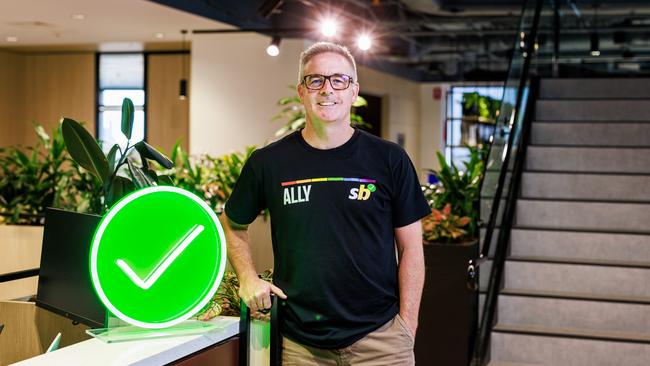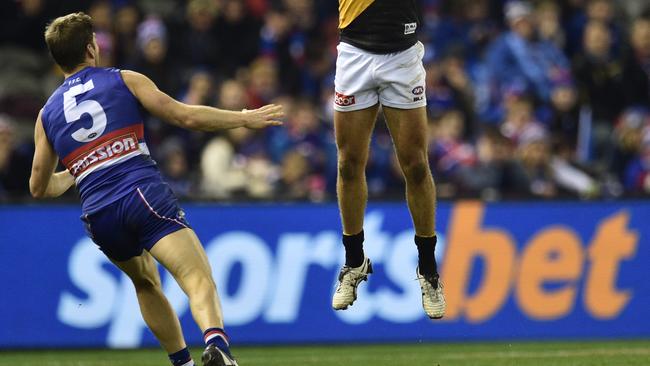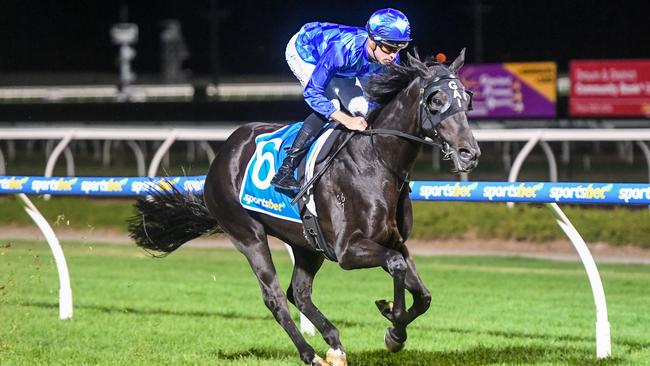We’re not a bunch of evil Machiavellians, says Sportsbet chief Barni Evans
Barni Evans has personal experience with the compulsion of gambling addiction and says his company is trying hard to mitigate the harm gambling can do.

Barni Evans was, for a short time, a gambling addict.
Growing up in England, the chief executive of Sportsbet – Australia’s biggest online wagering company – says he got addicted to playing the fruit machines, the British form of a slot or poker machine, that are usually found in the corners of pubs.
He was only a teenager but as Evans says: “I’ve been through that feeling of compulsion.”
Evans is talking in the context of problem gambling and harm minimisation processes, and whether as an online bookmaker with more than two million customers around Australia using its app and website each year, Sportsbet does enough to mitigate issues.
Not surprisingly, Evans says his company does, and he has both the personal experience and corporate structure – including remuneration-based incentives for his entire 1200-strong workforce in Australia – that he says can prove it.
“It was mild and I don’t want to overdramatise it,” Evans tells The Weekend Australian.
“And I look back and I think I wish that barman hadn’t let me gamble away my money when I was 13 or 14. Clearly I’m culpable too. I shouldn’t have been doing it. But I’ve been on that side.”
Evans is ready for his revelations to be met with some cynicism, especially ahead of a possible appearance in early April before a federal Parliament inquiry into online gambling and its impacts.
But in a rare interview, the Sportsbet boss is at pains to explain how he believes his company is going above and beyond current regulations to, in effect, protect gamblers from doing harm to themselves.

Yes, it plays the game hard. Sportsbet hasn’t become a gambling behemoth by playing nice to its competitors and its uniquely irreverent advertisements seem to be ubiquitous across television, radio and on websites.
Sportsbet takes bets from more than one million customers in Australia per month, and Evans says more than two million would use its app and website across an entire year. It returns huge profits to its London-listed parent, Paddy Power, making a $369m net profit in 2021 from $2.4bn revenue and then earnings before interest and tax, depreciation and amortisation of £390m ($709m) last year.
It now has a market share of about 44 per cent for all online sports and racing betting in Australia, far above rivals like Tabcorp, Entain Group and Betr, and claims to have paid $1.24bn in direct taxation and fees.
But Evans says it is unfair to say that bookmakers just want to make money from customers at any cost.
“How we are portrayed as an industry in the media would lead you to believe that we’re a bunch of Machiavellians who sit behind computers working out how to do evil. The truth of the matter is that is genuinely not the case,” he says in the boardroom at Sportsbet’s Melbourne headquarters.

“The first thing we have to do is start from a position where we recognise that our product can do harm. For a small proportion of people it’s not the right product.
“And it may well be to begin with but it becomes not so. And if you start from a … position of recognising that you can do harm, that really motivates you to get it right.”
All that betting revenue has come with some issues and regulatory scrutiny, though.
Sportsbet is the subject of an investigation by anti-money laundering watchdog Austrac (as are other bookmakers) over potential breaches and it paid a record $2.5m fine last year. It committed to refund customers about $1.2m, after breaching Australia’s spam laws.
It has also been reported that Sportsbet could be probed for allegedly allowing some customers the opportunity to place illegal in-play bets on racing or sports matches.
“I think regulators play an important role and no business is perfect,” is Evans’ retort when asked if a company like Sportsbet pushes the envelope too much in an effort to squeeze its customers.
“Every business will occasionally have a process that fails. Telecom companies, utilities, car companies. You see it happening everywhere. Clearly the role of the regulator is to say ‘that’s out of line (and) you need to fix it’. We really respect that.”
Evans harks back to his personal experience and also the culture he and Sportsbet management, supported by Paddy Power’s global board, in describing both his empathy for people with gambling addiction issues and how he claims Sportsbet tries to minimise the potential for its customers to bet beyond their means.
A few years after he had stopped playing the fruit machines, Evans worked as a nurse in a psychiatric hospital.
“(It) was mostly alcohol and chemical dependency, and a whole lot of other pathologies and depression and schizophrenia and stuff like that,” Evans explains.
“I’ve seen, therefore, what compulsion does – not just to patients but families as well. I was only there three or four years, I’m not a professor and don’t have all the academia and science, but I feel like I’ve got a well-rounded view at least.”
Evans says Sportsbet has spent about $25m on safer gambling advertising over the past 18 months. He says since it was introduced in 2015 Sportsbet’s “Take a Break” service that allows punters to lock their accounts for short or long periods has likely cost the company somewhere between $700m to $1bn of revenue that it would have otherwise made from allowing customers to keep betting.

Sportsbet looks more like a cutting-edge technology company than old-fashioned bookie and its offices are dominated by coders and engineers.
Evans says the company is harnessing that knowledge by building its own artificial intelligence-driven “real time intervention” service that will warn and then potentially stop punters betting if they are exhibiting signs of going too far.
“What it does is to map across customers, groups of people who are similar. And then it tracks those groups and each individual within that, then it layers on seasonality … then it adds in individual trends,” Evans says. “It then sets alarm bells when any individual deviates materially from that group.”
Customers will receive alerts asking if they want to place a bet if their habits seem increasingly erratic, then asking them to set a deposit limit. If the behaviour continues then a customer is locked out of their account and asked to speak to a Sportsbet employee.
Evans says all 1200 staff members – “from the receptionist to all the techies” – have a remuneration structure in place that has 20 per cent of their variable pay subjected to safe-gambling requirements. Employees dealing with high-betting VIP customers have had commission structures removed.
Evans also says people should not borrow money using credit cards and that bans on cryptocurrency gambling should not be lifted. He also stresses that all forms of gambling, including poker machines, should be part of the parliamentary inquiry.
Is all this enough to get critics off Evans and the gambling industry’s backs?
He admits it is unlikely, and stops short of saying, for example, that gambling ads should be banned during the nightly news or entertainment shows on TV. (Sports bodies and TV companies have argued they should be allowed given how crucial gambling revenue is to both.)
“What we are saying though is we’re not building a business to hit this year’s budget. We want to build a powerhouse. But we can do that by looking after our customers and abiding by the rules.
“We‘ve got to create sustainable growth, which is about sustainable long-term relationships with customers; not a burn and bust scenario.”




To join the conversation, please log in. Don't have an account? Register
Join the conversation, you are commenting as Logout